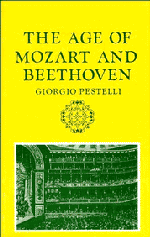II - VOCAL MUSIC
Published online by Cambridge University Press: 10 November 2010
Summary
Opera seria and opera buffa
Following the main course of instrumental music halfway through the eighteenth century has taken us a long way from Italy, but this country returns to the centre of discussion as soon as the topic of vocal music, and especially stage music, is considered. Here the Italian language, traditions and artists provided an accepted basis, the starting point for any innovations, both in Italy and in the rest of Europe.
In vocal as in instrumental music, the 1750s saw the twilight of great figures. Handel ended his contribution to Italian opera in 1741, and up to his death in 1759 dedicated himself to oratorio. In Paris Rameau's tragédie lyrique dissolved after 1750 into pastorales and less ambitious works. Metastasio, who lived in Vienna from 1730, was admired and surrounded by the court's affection, and provided an inexhaustible source of Italian operas for all the European theatres. But in the decade 1730–40 the imperial court theatre in Vienna, with its tradition of splendour, was approaching exhaustion. The gap left by Caldara was felt, the court put off nominating a successor, and one has the impression that the great operatic spectacle no longer interested the Viennese ruling class. Hasse, the champion of Italian opera in the years 1730–40, was the arbiter of Dresden's musical life, but the Seven Years' War put an end to this happy period and the composer moved to Vienna, where Metastasio, many of whose librettos he had already set, was living.
- Type
- Chapter
- Information
- The Age of Mozart and Beethoven , pp. 41 - 100Publisher: Cambridge University PressPrint publication year: 1984

